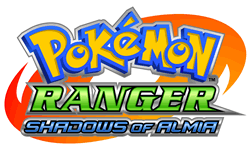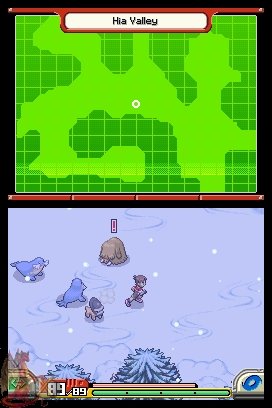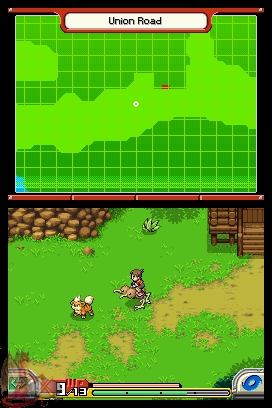|
|

|
PLATFORM
|
DS
|
BATTLE SYSTEM
|

|
INTERACTION
|

|
ORIGINALITY
|

|
STORY
|

|
MUSIC & SOUND
|

|
VISUALS
|

|
CHALLENGE
|
Easy
|
COMPLETION TIME
|
20-40 Hours
|
|
OVERALL

|
+ Vastly improved in virtually every way.
+ Surprisingly well-crafted plot.
- Sickeningly inspirational.
- Some obnoxious puzzle design.
|
Click here for scoring definitions
|
|
|
If there's one thing Nintendo knows how to do, it's milk its super-cuddly, collectable team of mascots, now 400 strong, for all they're worth. How many Pokémon spin-offs have we seen over the years? Pokémon Trading Card Game, Pokémon Mystery Dungeon, Hey You, Pikachu, Pokémon Pinball... The list goes on. The one thing that most of these degenerate cash-ins have in common is that they are, in a word, crap. However, every now and then — and it is a very rare thing indeed — one of these spin-offs manages to be more than just another Pokémon money-printing scheme, and 2006's Pokémon Ranger was one such game. Featuring a unique new method for capturing Pokémon that made impeccable use of the DS touch screen, Pokémon Ranger was a breath of fresh air in an increasingly stale series. Pokémon Ranger: Shadows of Almia is a follow-up to that game, and manages to improve on the original in nearly every way.
As Shadows of Almia begins, the player takes on the role of an up-and-coming Pokémon Ranger, a sort of Pokémon police force that protects the cities with the help of the collectable critters. The game begins with the protagonist attending Ranger school, and as the game progresses, he moves up the ranks to become a "Top Ranger," destined to stop the quasi-evil Team Dim Sum from using Pokémon to take over the world. One of the things that is actually surprising about Shadows of Almia's plot is that — brace yourself — it's actually quite good. Now, to be clear, that isn't to say it's a brilliant novella worthy of accolades; far from it. The characters are all typical, one-dimensional ancillary characters designed to amuse more than anything else, and the story's overbearing "power of friendship" themes can grate at times. The plot, though, is well-paced, well-crafted, and well-written, providing a wonderful backdrop for the addictive gameplay.
With any Pokémon game, of course, the gameplay more than anything else is what drives one to play. With hundreds of creatures to collect, evolve, and train, the Pokémon franchise provides an incredible amount of potential content for its consumers. The Pokémon Ranger series takes the "gotta catch 'em all" design philosophy of the main series in a new direction: rather than capturing and training the pocket monsters, the player temporarily (aside from a handful of permanent "partner" Pokémon) befriends them, using their special abilities only once before releasing them in order to solve puzzles or provide assistance in capturing more powerful ones. While the original Pokémon Ranger was mostly a puzzle game, steps have been taken to turn Shadows of Almia into a true RPG.
 Gotta catch and release 'em all!
Gotta catch and release 'em all!
|
|
Like the original game, players capture Pokémon by drawing circles around them on the DS touch screen. The Pokémon won't make it easy, however, as they'll regularly move around the screen and even launch attacks to break the player's capture line. While in Pokémon Ranger this meant starting from scratch, in Shadows of Almia, each loop adds points to the Pokémon's friendship meter. This meter eventually starts to drop if loops aren't drawn for a long enough period of time, but the player no longer has to capture it in a single attempt. This makes the game far less reliant on speed and adds a certain level of strategy to each encounter, providing for a less frenetic and far more enjoyable experience.
Leveling up in the game has a more significant meaning now as well. In addition to gaining health points, the power of the player's capture styler, a device used by all Pokémon Rangers, increases as well, reducing the number of loops needed to capture Pokémon. Of course, as the game progresses, more powerful Pokémon that require more friendship points begin to appear. To help with this, game progression also provides the player with new tools to assist in the capture of Pokémon, including the ability to charge and temporarily increase the power of the styler and the ability to use new PokéAssists. The game provides new tools at a regular, frequent pace throughout the game, which really helps to keep things from getting stale.
Many other new features have been added to the game to create a longer and more interesting experience. In addition to the main storyline, dozens of special quests provided by townspeople become available as the game progresses, each of which provide extremely valuable, permanent bonuses, including damage resistance, longer capture lines, and even new partner Pokémon. Pokémon Ranger teamed the player up with a Minun or Plusle, depending on the protagonist's gender, but Shadows of Almia allows the player to choose between a surprisingly large number of acquirable partner Pokémon, creating a more customizable experience.
 Pokémon have many uses.
Pokémon have many uses.
|
|
In addition to the basic gameplay improvements, the world itself has opened up to allow for more exploration. The levels are plentiful and varied, and each contains several nooks and crannies with hidden, rare Pokémon to discover and catch. Unfortunately, there are other aspects of the level design that are simply obnoxious, in particular an overabundance of irritating, "screw up and start over" walking puzzles, where a misstep causes the player to start from the beginning of the room.
Graphically, the game hasn't changed much from its predecessor, but that isn't a bad thing, as both games feature detailed sprites and vibrant environments that quite simply put Pokémon Diamond and Pearl to shame. The audio, unfortunately, is pretty much identical to every other Pokémon game ever released. The music is catchy, and surprisingly varied throughout the game, but consisting entirely of low-quality digital tracks. The sound effects also haven't improved any, continuing the Pokémon tradition of unidentifiable creature cries.
Overall, Shadows of Almia is a huge improvement over the original game, and in many ways has created a new series that could potentially become as popular as the main line, but there is still much room for improvement. Shadows of Almia's length is more than double that of Pokémon Ranger, lasting a solid twenty hours, with many more available for those interested in completing the additional twenty quests that become available after the main storyline, or even for those who simply want to complete the Pokédex. The game is a fair bit easier than its predecessor as well, but not too easy. Although it still has its fair share of problems, Shadows of Almia is a fun game that, hopefully, marks the beginning of a new and long-lasting Pokémon series.
Review Archives
|









